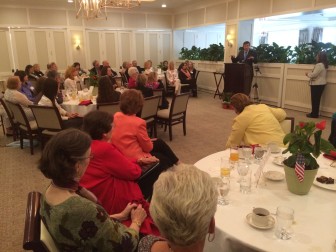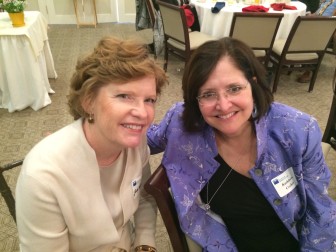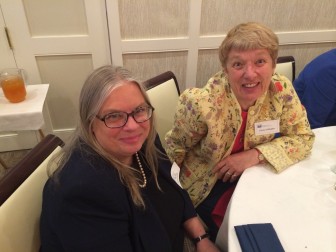The nation’s youngest senator—a fourth-generation Connecticut native on both sides of his family—on Friday told a room full of New Canaanites that the nation’s biggest challenge is its lack of investment in itself.
The United States is at an historic low when it comes to government investment as a percentage of gross domestic product, U.S. Sen Chris Murphy (D-Conn.) said during an annual luncheon organized by the League of Women Voters of New Canaan.

More than 50 New Canaan residents attended May 14, 2014 League of Women Voters of New Canaan annual luncheon at the Country Club of New Canaan, featuring guest speaker Sen. Chris Murphy. Credit: Michael Dinan
“We are spending less than 3 percent of our GDP on non-defense discretionary spending—that’s basically education, transportation and science,” Murphy told more than 50 attendees gathered in the ballroom at the Country Club of New Canaan.
“And if you want to know what the worry is that keeps me up at night, it’s that we are going to fail to recognize the true greatness of this country which has been this wonderful marriage between public sector investment and private sector ingenuity. Put money into your schools and your roads and your bridges and into science, and the private sector will do awesome things with those investments—create jobs, make new innovations, lead the world. The private sector is still doing their end of the bargain. The public sector is not.”
Murphy’s address—and a substantial question-and-answer session moderated by league member Beth Jones—anchored the approximately 2-hour event. It included lunch and an introduction to Murphy from the league’s Kit Devereaux.
“I apologize for my lateness,” Murphy, who arrived just a bit after his scheduled time, said when he took to the podium. “Apparently there is traffic in Fairfield County.”
Here’s a video with Murphy’s response to a question regarding Vladmir Putin, president of Russia (article continues below):
The 40-year-old Murphy served in both houses of the Connecticut General Assembly and then the fifth district of the U.S. House of Representatives from 2007 to 2013—the district includes much of northern Fairfield County, including Newtown. He defeated Greenwich’s Linda McMahon in the 2012 U.S. Senate election for the seat vacated by a retiring Joe Lieberman.

Judy Neville and Kathleen Corbet were in attendance for the League of Women Voters of New Canaan’s luncheon on May 16, 2014, featuring Sen. Chris Murphy. Credit: Michael Dinan
Murphy shared some anecdotes of his time in Congress, drawing laughter from the room more than once and conveying gratitude and enthusiasm in holding the position of U.S. senator.
Topics addressed during the Q&A portion included net neutrality, small businesses and tax incentives for startups, Vladmir Putin, the environment and Benghazi.
Here’s some of what he said:
Transportation expansion in Connecticut (rail and highway)
Murphy: “I’m working on a bipartisan bill with some Republicans in the House of Representatives right now to set up a new loan program for the state’s rail authorities to do big projects in partnership with the private sector to, in a way, guarantee that investments from the private sector into these rail lines get some more public-private partnerships. On roads, the situation is pretty dire, in that the trust fund which funds our highways is going to run out of money this summer. Why is that? It’s because we haven’t raised the gas tax in 20 years, and I know that is not any fun and nobody wants to see higher taxes. But the reality is that the way we fund our roads is through the gas tax, and when you haven’t put a new dime into the gas tax fund in 20 years, you get what you pay for. And the deal for Connecticut is a pretty good one. The formula for transportation funding means that Connecticut gets back 1.6 cents back for every cent we send to Washington on gas tax. Now you know, especially here in New Canaan, that that is not the deal with respect to income taxes, but it is the deal on gas taxes.”

Betty Lovastik and Eloise Killeffer, both members of the League of Women Voters of New Canaan, at the May 16, 2014 annual luncheon at the Country Club of New Canaan. Guest speaker was Sen. Chris Murphy. Credit: Michael Dinan
Student Loan Interest Rates
Murphy: “I am a member of the squeeze generation. I don’t complain for one second about the amount of money me and my wife make. But we are both still paying back our student loans, and we are furiously saving for our two sons for college. We’ve got a 5-year-old and a 2-year-old. So they are still a ways away, but it is frightening to think about it when I do my little calculations of what college is going to cost 15 years from now. And the cost of college is going to make it harder and harder for people to get to college, and harder and harder to finish college. But also just squeezing middle-class family’s budgets all over the place, so that they are not putting money into the real mainstream economy and they’re putting money into banks. So we have done something already, which is that we already cut the interest rate in half. It used to be that the standard student loan interest rate was 6.5, it’s now about 3.5, so that’s a good thing. We have increased the Pell Grant by one-third in the time that I have been in office, and we’ve got a proposal that we will vote on in the Senate in the next couple of weeks, which for borrowers that didn’t get a chance to take out at the 3.5 percent rate, will get to refinance at 3.5 … We have got to start doing something other than just giving money to students. We have got to start pressuring the colleges to charge less and to deliver more. Because if you just feed the beast, there is no incentive to become stabilized. We have a system of higher education that is 100 years old, that somebody has got to stand up and challenge.”
Gun Control Legislation
Murphy: “I think that what we realized was that we couldn’t change minds with Newtown alone. I don’t know why that was the case. Obviously I was as close to it as anyone. I was there in the firehouse that morning and afternoon and my life is just fundamentally different. Fundamentally different since December 14. And I just thought that everybody saw that, even if they weren’t there with me, that they saw what happened and they saw that the law contributed to the carnage there. That six kids escaped when he had to reload, and he only had to reload three or four times, so it stands to reason that if he had to reload 10 or 12 times, that there would still be more kids alive. I thought everybody would see that, and they didn’t. And they didn’t in part because the political infrastructure around the gun lobby is just enormously powerful. More powerful than I thought, and so our mission now is to build a political infrastructure around antigun violence and that is going to take a while. That doesn’t happen overnight. That will take a slow build over time. But you can’t have the mood of the American public this far out of staep with the voting record of the Congress for too long without there being repercussions. Bans on assault weapons is a closer call with the American public but background checks are not. Eighty percent support background checks on gun purchases, 90 percent in some polls, and Congress will catch up. It’s just going to take a little while. And I think for those of us who support changes in gun laws, we should really make sure that we admit that this is complicated.”
Here’s another video of Murphy, from his opening remarks: